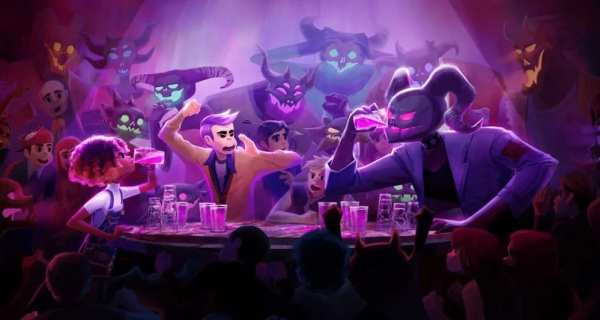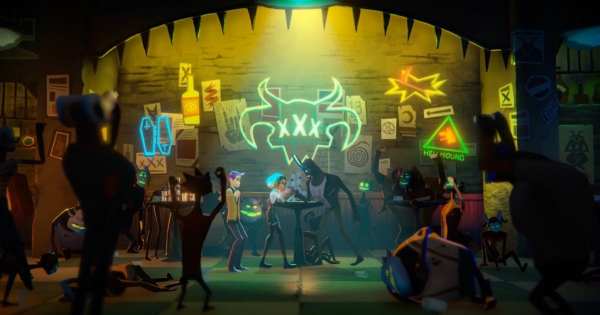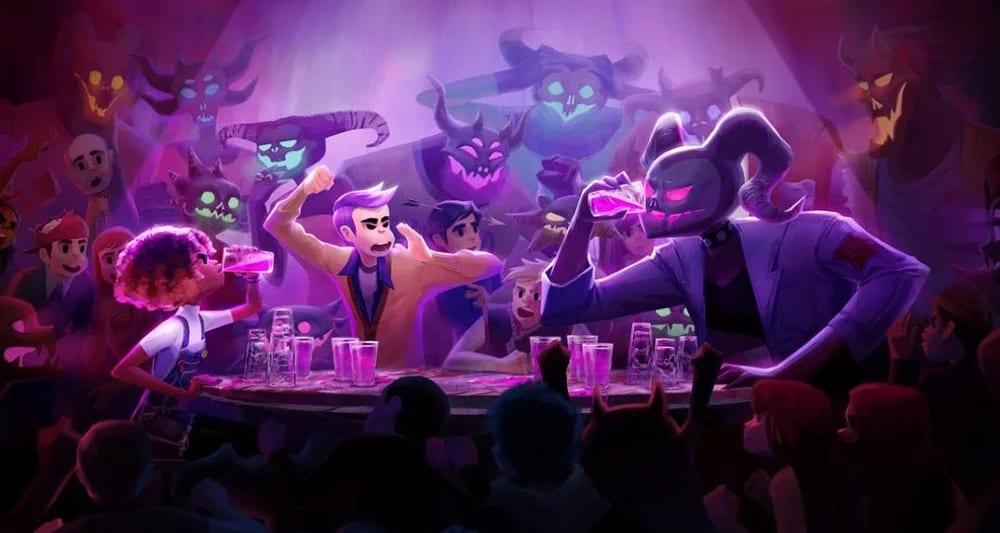
SPOILER WARNING: This feature contains major story spoilers for Afterparty. Back off if you haven’t played it and plan to do so anytime soon.
When I was 19, I went to visit a group of high school friends who had decided to go to a different university. They went to a famous ‘party’ school, revered for it’s legendary parties and drinking-focused school events.
I just happened to arrive at the start of a drinking game called a ‘century’. This is when participants sit within view of a judge who holds a stopwatch. Each minute, every participant is required to drink one shot-glass of beer for 100 total minutes.
Whoever could last all 100 minutes were awarded a small prize from the upper years hosting the event. My friend happened to be participating, along with 20ish others all seated on various beer pong tables stretched across the quad.
It started out alright, people were clearly feeling buzzed and gloated loudly about how easy it was. But at around the 50 minute mark it started to feel less fun, and more weirdly obligatory.
Only a few dropped out, as there was an implied sense that whoever did drop out would be a buzzkill, would seem less ‘fun’ to this growing group of people who had stopped to watch how the last minutes would go down.
I felt uncomfortable, I was worried for my friend. But I tried not to worry so much, it was a fun party atmosphere. University was like this, drinking this way is fun. Just look at how happy everyone was, even some RAs wearing official university uniforms were cheering them on to continue.
At the 75 minute mark, a girl stood on one of the tables, held up a microphone, and announced the remaining participants are now allotted their ten minute ‘barf break’. She motioned to some doors to her left that led to the nearest bathrooms in one of the dorms.
My friend and the others lept up and ran to the bathrooms. While some were getting sick from the booze itself, I was told later some were forcing themselves the vomit simply so the rest of the game was easier and they didn’t have to worry about failing in front of the crowd.
It wasn’t about having fun, or winning the prize, or even drinking to feel drunk, it was about looking cool in front of your peers. Finishing the century wasn’t necessarily forced, but the pressure to was undeniably implied. It was an initiation not into a specific fraternity or sorority, but into university culture itself.

Night School Studio’s latest release Afterparty plays with this idea of the normalization of binge-drinking at universities by portraying Hell in a very similar way. The two main characters, Milo and Lola, have just graduated from university themselves but unknowingly perish in a car accident on the way to a final graduation party.
As the walls literally fall down around them, they find out that not only is hell real, apparently they were bad enough people to find themselves there for the rest of eternity. After a few minutes of initial confusion, they head up to processing to find out what their daily torture will be.
Hell in Afterparty works likes a 9-6 work obligation where on-the-clock it’s non-stop torture but after hours you are free to do whatever you want. As it turns out, the only thing people in hell tend to do with their free time is drink.
On my second playthrough I tried to see how long I could go before drinking was made obligatory. I was able to avoiding drinking at the earth party entirely, but this changes at the very first bar you frequent in Hell.
A demon asks you to pick your poison, and a friendly serial killer named Thomas raises his glass of Hellcohol for a toast. Pausing and simply waiting for the others to drink will create an awkward moment of silence. The bartender demon will make a few funny quips encouraging you to hurry the hell up, but there is no actual option to abstain from drinking it. The only way to not drink it is to not play the game. But the game is well-written and fun, so you want to be a part of it.
Thomas remarks, “You should notice you feel a little…empowered, right? Maybe a little freer?” In Afterparty drinking actually allows you more dialog options based on the type of drink you consume. You could be more witty, flirty, smart, brash, angry, or even talk like a pirate if you want to.
You’re able to communicate with demons better in this way. It’s easier to convince them to like you, do something for you, or simply be seen by them as a normal and functioning member in their Hell society.
This is shown right away, when a ‘Drunk Idiot’ demon walks up to the bar and starts badgering Milo. Trying the two normal dialog options will have no effect, but the third and more hostile option only available because of the drink Lola just chugged will be enough to force him on his way.
Afterparty makes it very clear right away that drinking is not only normal in Hell, it’s expected of every member of society and is the common denominator in how every demon and human interacts with each other.
If you want the game to go easier and feel even remotely empowered in this hellish society, you’re going to have to drink.

Milo and Lola soon learn of the standing offer Satan has kept around throughout the ages. If you can out-party him, out-drink him, and earn his respect, you can go back home.
Despite the fact that only two others have ever completed this task before (Buddha and a velociraptor as it turns out), Milo and Lola decide that them being in Hell has got to be a mistake and they need to out-party the Prince of Partying in order to get home.
With all the whispers you’ve heard about Satan thus far, you get pretty eager to finally meet him in person. You actually get a chance to see him before the end of the game, and this first impression of Lucifer is almost as important as your final impression.
The line to get into his party is comedically long, his presence is awe-inspiring at over 17 feet tall, he knows everybody’s name, and mostly he just seems like a super chill dude. This is all tied together by the vocal talents of Dave Fennoy, who portrays Satan as exceedingly smooth and easy-going. Demons and humans flock around him, and instead of being high and mighty he mostly just comes off as down-to-earth and polite.
Milo asks him why he doesn’t allow more people to leave Hell if he bothers to include an escape clause, Satan responds “It’s like ants Milo. You see one, maybe it just came in on your jacket. You see a dozen…you’re spraying. And, believe me, you don’t want to see God spraying.”
So Satan isn’t such a stereotypical bad guy after all, he’s the life of the party. But he tells you in order to out-drink him you first have to get the seals of approval from his fallen angel siblings.
As you meet with Satan’s family, you start to get the sense something is going on behind the scenes. His sister Apollyon is Hell’s most famous lawyer, and asks you to throw a case for a man who appears to be innocent of any crime. If you refuse, you won’t get her seal.
It’s clear Apollyon desperately needs this guy to stay in Hell for something. Small hints keep getting dropped that the fallen angels are organizing to overthrow Satan, who apparently hasn’t been running Hell as well as the good old days.

With seals in hand you return to Satan’s to find a party that has pretty much run its course. The line is now non-existent, anyone left is either passed out or almost passed out, and Satan isn’t as charming as you initially found him.
His words and memories are sluggish but he still seems set on keeping the party going. This is when Afterparty takes a turn that will make you drastically question your perceptions of Satan thus far.
It turns out Satan’s siblings aren’t looking to overthrow him. Instead, they have agreed to come to host an intervention for his drinking problem. The man you doomed to Hell in the trial turns out to be the leading interventionist expert back on earth.
As his siblings stress the need for Satan to acknowledge his problem, Satan’s friends pipe up saying ” Are you kidding me? Luke is fine. We party. So what?” Satan ignores both his family and enablers, and after lighting the interventionist on fire says, “Milo. Lola. I think we have a drinking contest to start.”
Milo responds with a thought the player is likely also thinking, “Maybe this doesn’t seem, uh, appropriate anymore?”
Regardless of this, Satan forces you to begin the drinking contest. Mainly as a means to distract himself from the firm but loving words of his concerned family. The player feels guilt from not only enabling Satan’s drinking problem by undergoing the challenge, but also the guilt that you did not notice his drinking problem sooner.
There’s a gap in knowledge on what constitutes binge-drinking when you compare students embedded in a university culture and others where it’s not as normalized. The National Institute on Alcohol Abuse and Alcoholism defines binge-drinking as four drinks for females and five drinks for males over a two hour period.
However, students at universities where excessive drinking has been normalized will have a perception that only a much higher than normal quantity of drinks in a certain time period actually constitutes as binge-drinking. Where there’s this disconnect, it is much harder to notice when someone is struggling with alcoholism.
This is exactly what happens in Afterparty. Hell is a culture built upon drinking excessively. You are able to do more and fit in better if you drink while in this environment. Satan being the “Prince of Partying” is a badge of honor, so why would one question his binge-drinking when it has been not only normalized but revered to such a large extent?
The Substance Abuse and Mental Health Services Administration describes heavy alcohol use as binge-drinking on five or more days in the past month. With Satan having a rager every single night of the week, it’s clear he indeed has a problem.
Afterparty then offers you a choice. For the final round of the drinking contest, you can attempt to beat Satan and potentially go back home, or refuse and stay in hell.

Refusing takes effort. Satan will try over and over again to get you to give in. He desperately desires it because for Milo and Lola to drink with him is a lack of acknowledgement of his problem.
If you give in and win, Satan returns to the party to pass out alone. His friends and family leave him, as well as Milo and Lola who get to return to their lives back on earth. In the final cutscene, Milo and Lola seem happy and don’t mention Satan or his well-being at all.
If you stay firm and forfeit however, Satan breaks down and agrees to go to rehab for the night. Abstaining acknowledges Satan’s issue instead of ignoring it for personal gain. Lola says, “Yeah, we all wanna drink our faces off and forget our problems and not be responsible. But…if we drank each other into oblivion, nothing would really work, would it?”
Afterparty’s interpretation of Hell is allegorical for the environments many students find them in while attending university. While Biology and Psych classes don’t really count as 9-6 torture, the “afterparty” or after-hours time so to speak is still very focused on drinking-related activities.
In both Afterparty and at a university campus party it’s easier to talk to and be accepted by those around you if you are drinking. Drinking excessively is seen as the normal thing to do in one’s free-time, and it’s harder to notice when someone is having a problem with alcohol abuse when binge-drinking is the norm.
According to the 2017 National Survey on Drug Use and Health, 53.6 percent of full-time college students ages 18-22 drank alcohol in the past month; 34.8 percent engaged in binge drinking in the past month; and 9.7 percent engaged in heavy alcohol use. These rates are higher than those of the same age not attending university.
Drinking at university can be fine. But it is worth acknowledging that there is a noticeable disconnect between people in and out of these environments on what counts as alcohol abuse.
Acknowledging the problem made things better not only for Satan; but for Milo and Lola as well. They’re not back on earth, but the final cutscene shows them thriving in this new place with new friends and new job prospects.
Milo and Lola had to step away from the drinking contest, just like some university students had to step away from the peer pressure of continuing the century.
This can be an prodigious thing to do when everything and everyone around you is cheering for you to do the opposite.





Published: Nov 19, 2019 11:00 am